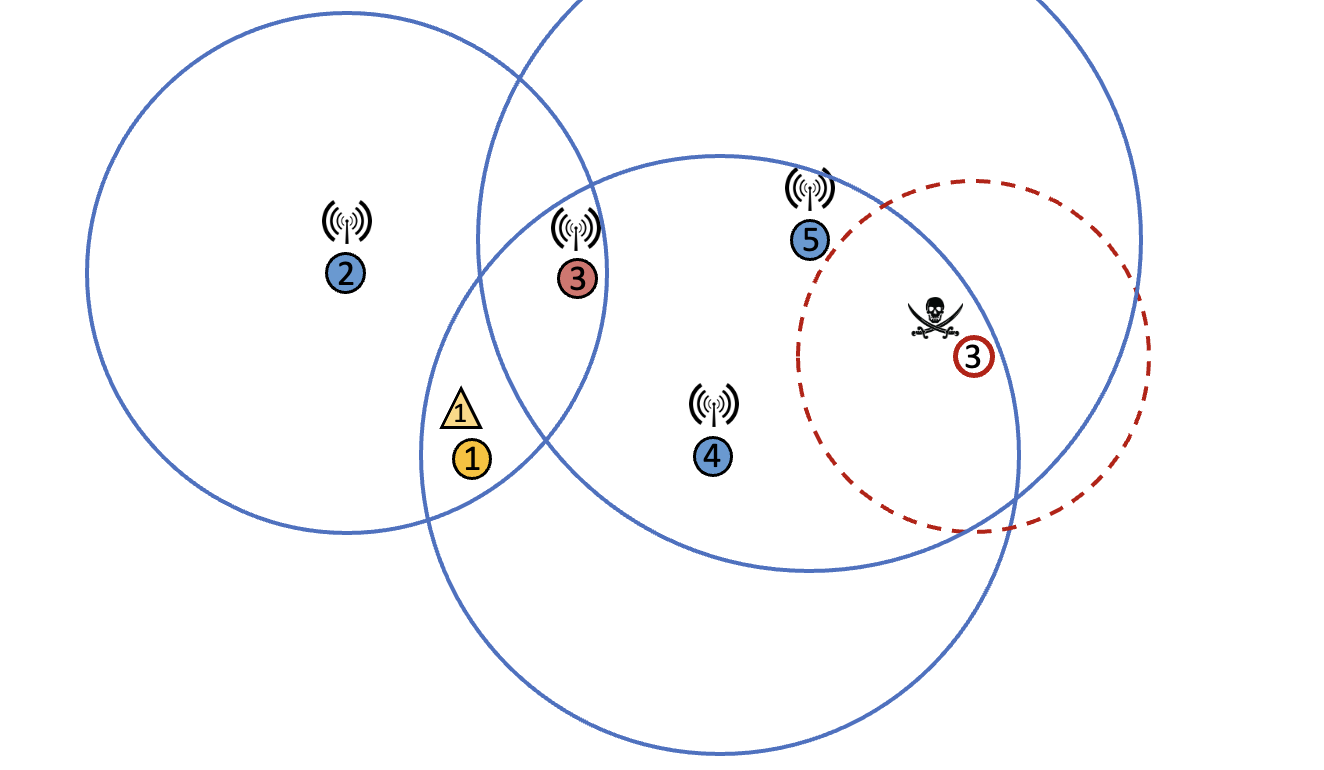ACC 2023
RSSI-based Localization with Adaptive Noise Covariance Estimation for Resilient Multi-Agent Formations
This work has been accepted to the IEEE American Control Conference (ACC) 2023 and will be presented from May 31st - June 2nd in San Diego, CA, USA.
Abstract: Cooperative multi-agent swarms exchange reliable information to coordinate their motion in proximity-based control consensus schemes to complete a common objective. However, in the event of malicious cyber-attacks or faults to localization/position sensors (e.g., global positioning sensor (GPS)) on-board individual agents, global control performance may be compromised, resulting in a hijacking of the entire multi-agent system. For multi-agent systems that operate in unknown or landmark-less environments (e.g., open terrain or an ocean/sea), compromised agents can not rely on landmarks to aid in localization. To recover from these potential cyber-attacks/faults, we propose for compromised agents to leverage Received Signal Strength Indication (RSSI) from the other agents (i.e., mobile landmarks) as position measurements to aid in position estimation (i.e., localization). Furthermore, to minimize estimation error, agents with compromised localization sensors perform: i) RSSI-based multilateration that leverages received position information from neighboring agents as mobile landmarks; ii) weighted least squares (WLS) with hyperbolic weighting matrix for minimized error in RSSI-based position measurements; and iii) adaptive Kalman Filter (KF) to update the unknown RSSI-based measurement covariance matrix at runtime to minimize estimation error. The proposed decentralized framework is demonstrated with simulations on multi-agent swarm formations in the presence of cyber-attacks and faults to localization/position sensors.

The recent use of mobile multi-agent systems (MASs) have allowed for increased performance and efficiency to complete autonomous operations/tasks as compared to single robot operations. Specific examples that gain an advantage with the use of MASs include search and rescue maritime operations, military convoying/platooning in open terrain, cooperative surveillance, and exploration missions within unknown environments. To enable decentralized cooperative behavior to successfully accomplish operations, consensus algorithms for formation control are used to allow agents to satisfy a desired global performance.
Typically, approaches that utilize MASs make the assumption that all agents are cooperative during operations. A single uncooperative agent that shares incorrect information can affect the performance of the entire swarm, thus preventing objectives from being accomplished and potentially hijacking the swarm to undesired states. As a result, strategies for swarm resilience are of great concern to maintain system performance to effectively complete desired operations. In this work, incorrect sharing of information by an agent can be due to on-board localization/position sensors that experience malicious cyber-attacks or are defective/faulty. Compromised agents that no longer have a reliable sensor for position (i.e., loss of observability) lose localization capabilities within the environment, which consequently diminishes formation control performance.
The focus resides on the problem of resilient coordination in multi-agent mobile swarms that leverage control consensus schemes while maintaining desired formations in open or unknown environments that do not offer landmarks for use in localization. To deal with this, the proposed framework enables compromised agents to leverage Received Signal Strength Indication (RSSI) and received state (e.g., position) information from neighboring agents (i.e., mobile landmarks) for localization. More specifically, multilateration is performed using measured RSSI and received neighboring agent’s states to provide position measurements in replacement of the unreliable (i.e., compromised) on-board position sensors. To minimize the RSSI-based position measurements, a weighted least squares (WLS) method is used with a hyperbolic weighting matrix that leverages the commonly utilized log-normal shadowing path loss model. Moreover, the RSSI-based position measurements have unknown covariance which differ from the nominal on-board position sensor. To improve state estimation performance, compromised agents leverage an Adaptive Kalman Filter (AKF) to estimate the position measurement covariance matrix at runtime. The proposed framework is introduced in a generalized manner that may be used on any formation control technique for swarms of homogeneous linear time-invariant (LTI) modeled agents.
Videos will be included on this page once this work has been completed!